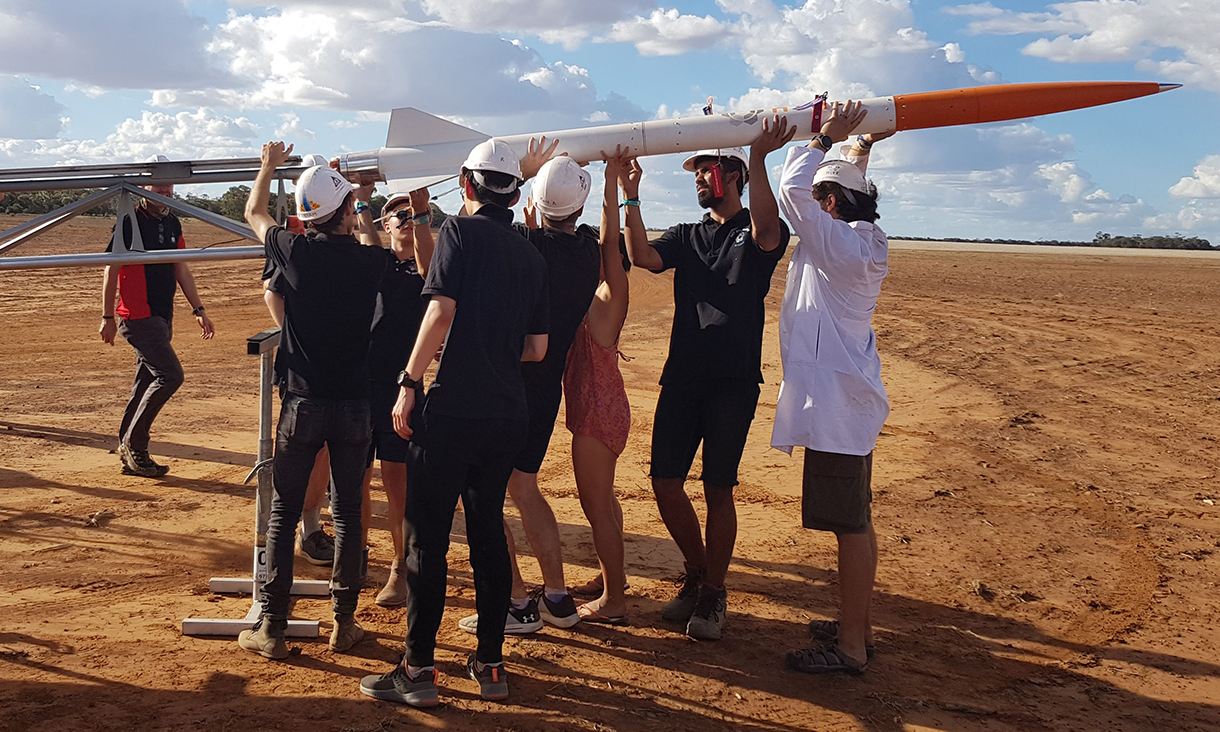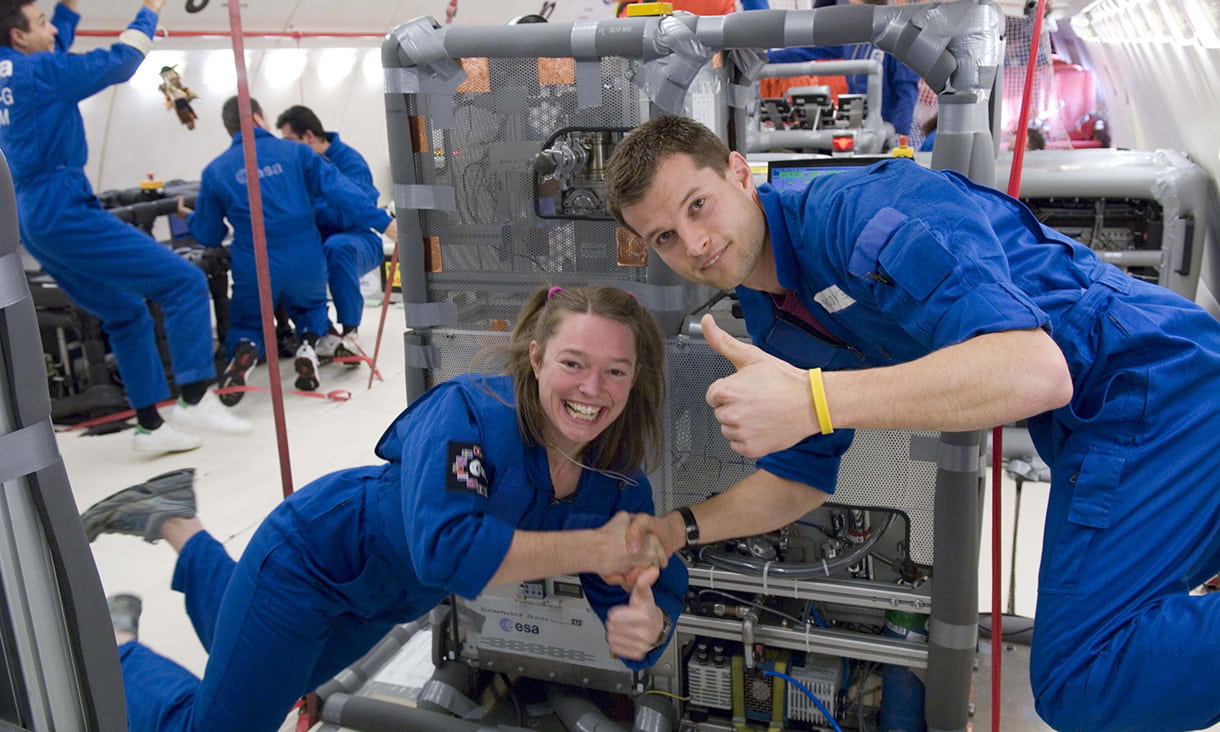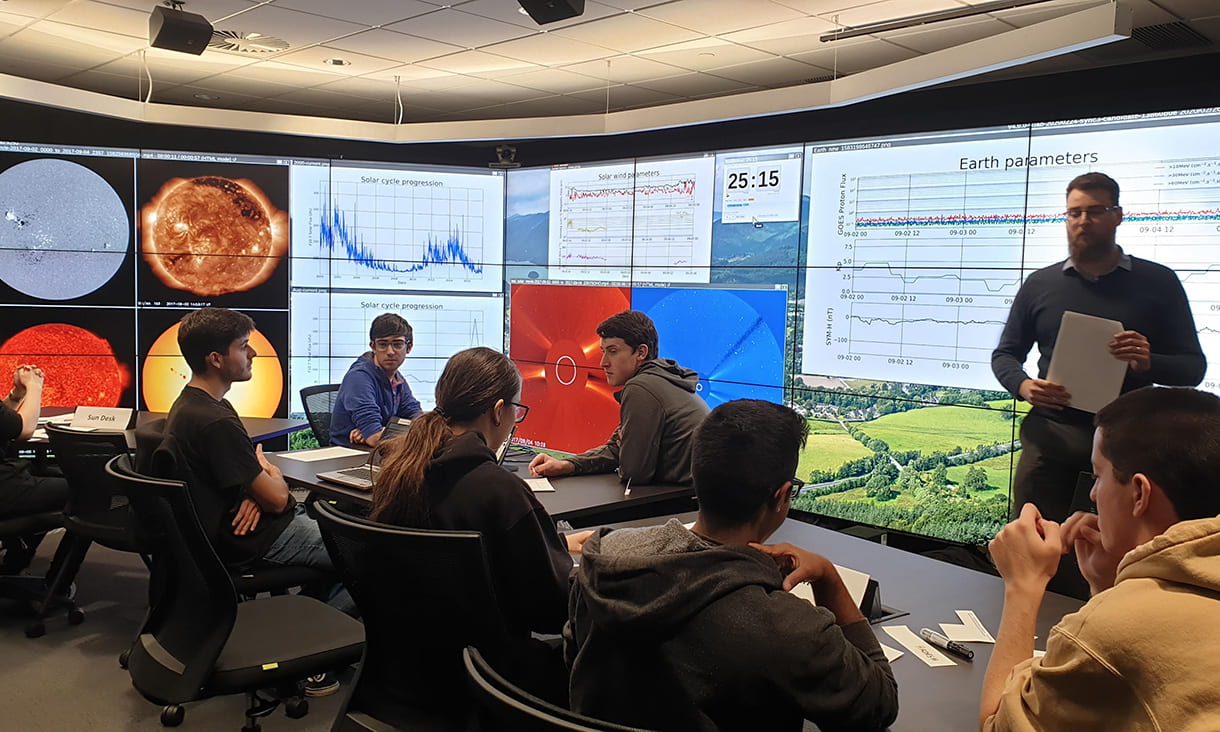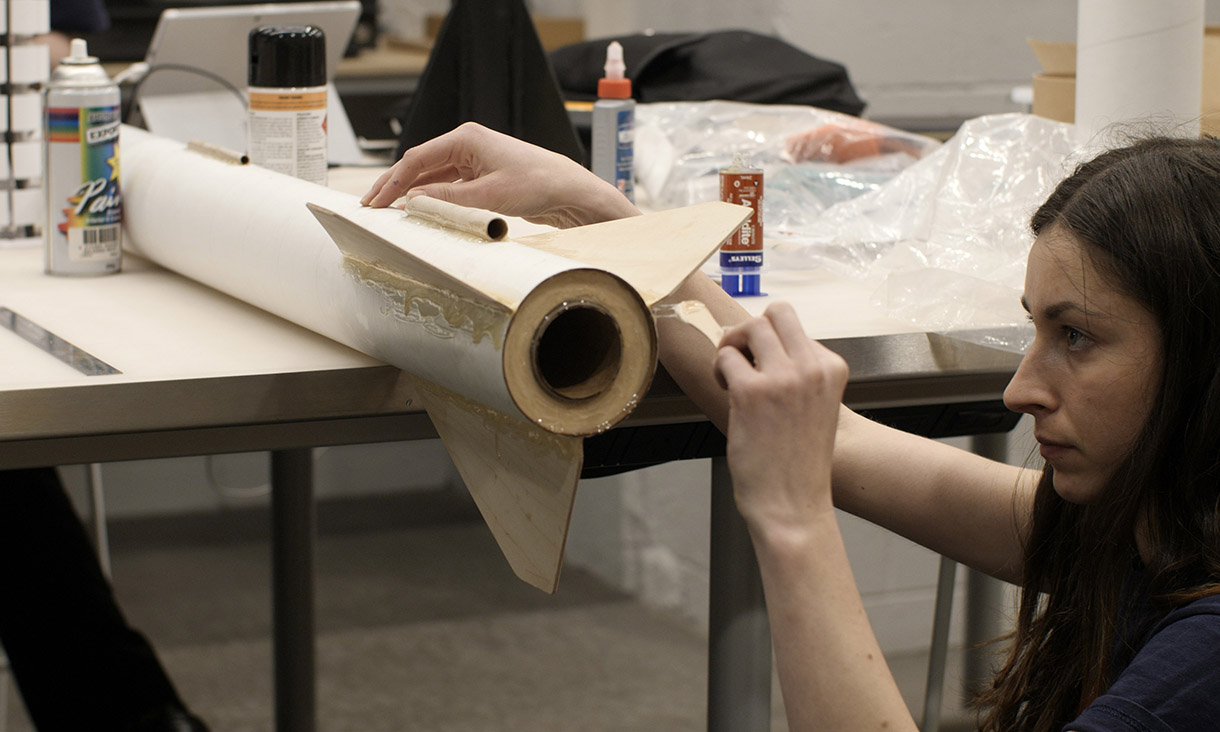Careers in space aren’t all about astronauts in spacecrafts. In fact, if you want to make the world a better place, space is the perfect sector to start.
When you think of working in the Australian space sector, do you think it mostly involves men in space suits?
That myth was quickly busted by the panel of space experts at the Careers with STEM: Space Careers webinar, one of whom was Dr Gail Iles, a former researcher for the European Space Agency who is now a Senior Lecturer in RMIT’s Bachelor of Space Science.
Among the facts that careers in space are vast, varied and growing in demand, these are our top takeaways from the webinar that all aspiring innovators should know.
 HIVE is RMIT's student-led multidisciplinary rocketry team and the proud winner of the inaugural Australian Universities Rocket Competition – 30,000ft. Image: Dr Gail Iles.
HIVE is RMIT's student-led multidisciplinary rocketry team and the proud winner of the inaugural Australian Universities Rocket Competition – 30,000ft. Image: Dr Gail Iles.
#1: Space technology improves our everyday lives
Did you know that everyday habits like checking the weather, tracking your food delivery and tuning into live soccer matches on the other side of the world would not be possible without space technology?
“In a COVID-normal environment alone, we rely heavily on streaming of games and worldwide activities,” said Anny Daily, who works in Operations and Communications at the RMIT-partnered Australian Space Agency.
“The reason why we know what’s happening in the UK within minutes is because TV camera people can broadcast it, and they all use space technology to do that.
“Space improves our day-to-day lives. It’s part of making the world a better place, and if you want to care for the environment and for people, you can do that by working in space.”
#2: There are lots of space jobs in Australia, and that number is only projected to grow
The Australian Space Agency aims to triple the size of the space sector and create up to 20,000 new jobs by 2030. But even today, the Australian space sector is thriving.
“You don’t have to go overseas to get a job in space. In Australia, we have a whole wealth of careers, jobs, internships and opportunities available,” said Dr Gail Iles, a Senior Lecturer in RMIT’s Bachelor of Space Science.
The degree is closely linked with industry partners, giving students the skills to take advantage of this current and future sector growth.
“We’ve built a very industry-focused degree. The idea is that our graduates, after just three years, will go straight into the space industry in Australia,” said Dr Iles.
“We’re working very closely with companies like Saber Astronautics to ensure that there’s a steady stream of flight controllers for the new mission control centre. We’re working with rocket launch providers so that we can send our engineers and technicians to South Australia, the Northern Territory and New South Wales.
“We’re looking to broaden all our partnerships as much as possible, and even put experiments on space stations – and this is all going to be from Australia.”
 Dr Gail Iles is a former researcher for the European Space Agency, as well as a former astronaut trainer who conducted experiments in zero gravity. Image: A Le Floch.
Dr Gail Iles is a former researcher for the European Space Agency, as well as a former astronaut trainer who conducted experiments in zero gravity. Image: A Le Floch.
 The RMIT SPACE Research Centre focuses on the development of Platform Technologies for Space, Atmosphere and Climate. Image: Dr Gail Iles.
The RMIT SPACE Research Centre focuses on the development of Platform Technologies for Space, Atmosphere and Climate. Image: Dr Gail Iles.
#3: Innovation and diversity is what’s next for space science
One of the Australian Space Agency’s goals in the next three to five years is to make history by having the Australian flag on innovative technology that could land on the moon.
“We’re going to be demonstrating capabilities that Australians have, and putting Australian businesses into supply chains of international organisations,” said Anny Daily.
“This is really exciting for the industry because it means that lots of companies can be involved in doing something that the nation can be incredibly proud of.”
Aside from Aussie innovations on the moon, diversity and inclusion will also be a large focus of space agencies around the world.
"The European Space Agency is keen to not only increase their female astronaut cohort, but they have also announced that they want to launch the first para-astronaut into space,” said Dr Iles.
“This is particularly fascinating because on an orbiting spacecraft, your legs actually aren’t very useful because you can’t walk anywhere.
“The call has gone out to those with lower limb disabilities, and it’s going to be very interesting to see how that develops.”
#4: You don’t need to be a maths whiz – you just need to be passionate about what you do
All the panelists agreed that when it comes to finding your niche in space science, it’s all about trying new things until you find something that clicks.
“Participate in all the opportunities that come through to you. There are space camps, shows, talks, and many other things you can be involved in,” said Anny Daily.
“You don’t need to be a maths whiz; I find that just having a curious mind will give you those opportunities. This is an industry that attracts really passionate and inspired people who want to make a change.”
And if you aren’t sure what path is right for you? That’s okay too. Helen Maynard-Casely, a Planetary Scientist at ANSTO, encourages everyone to follow what they’re interested in.
“My headline advice is not to panic. I used to be utterly terrified that by choosing a particular path, I was going to be putting the shutters down and limit myself from doing something else in the future,” she said.
“What I’ve realised is that there is no wrong path. If you follow what you’re interested in, you literally can’t go wrong.”

#5: Working in the space sector opens a world of opportunity for your career
Anny Daily kicked off her portion of the panel by busting a few more common myths around jobs in the space sector.
“We tend to think of engineers in quiet rooms, but the reality is that there are some really exciting jobs out there. I’m an engineer, but I tend to use those skills in a business and communications manner,” she said.
“At the Australian Space Agency, we need scientists across different career pathways. Commerce – the business side of space – is growing dramatically. We’re also interested in the regulation industry and employing space lawyers who can put us in good stead to meet our international obligations.”
Thomas Ireland, Software Engineer at Gilmour Space Technologies, also noted that the diversity of careers in the sector gives people career flexibility.
“We have people that started off in different fields, like a former medical science researcher who’s now in an engineering role, and former tradesmen who went back to uni and are now engineers.
“If you don’t know exactly what you want to do right now, that’s completely okay. It’s okay not to have it all figured out straight after school,” he said.
Story: Pallavi Daniel


